Biz Lounge: Covid pandemic leads woman towards lucrative ornamental birds business in Naivasha
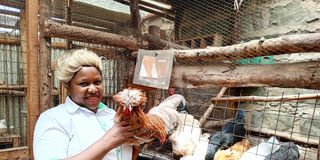
Joyce Kiara holds a Polish Bantam at her farm in Naivasha on October 20, 2023.
Joyce Kiara's journey from misfortune to prosperity is an inspiring tale of resilience and entrepreneurship.
In the midst of a challenging period during the Covid pandemic, Joyce was forced to sell off her 2,000 chickens and 15 dairy cows.
At the time, there were no available markets for her produce yet the cost of production was getting high.
However, she didn't let this setback deter her.
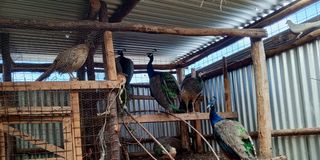
Peacocks at Charis farm in Naivasha on October 20, 2023.
In her pursuit of a fresh start, Ms. Joyce turned to online platforms to explore new, profitable opportunities within the agriculture sector.
After diligent research, she discovered the potential of ornamental bird farming, a relatively unexplored territory for her.
With determination and a modest investment of Sh 30,000, Joyce embarked on her ornamental bird farming venture, beginning with two pairs of silk bantam and turkeys.
Her clever use of existing sheds helped reduce start-up costs.
Also Read: Biz Lounge: From almost facing closure to building one of Nakuru's top Ankara fashion brand
Joyce quickly realized that to succeed in this endeavour, she needed to complement her ornamental bird farming with aquaculture, a practice demanding substantial resources, thorough disease management, proper habitat, and attention to the birds' unique needs.
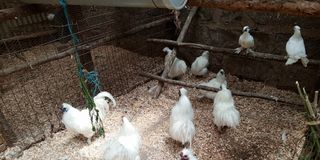
Silk Bantam birds at Charis farm in Naivasha on October 20,2023.
Recognizing the educational value of her farm, Charis Farm Naivasha, Joyce sought a license from the Kenya Wildlife Services to rear wild birds like peacocks, attracting a growing number of visitors interested in ornamental birds.
Today, Joyce's business has flourished, boasting 150 ornamental birds from 20 different species, with prices ranging from Sh 7,000 to Sh 350,000 in the case of the peacocks.
Among the ornamental birds Joyce is rearing include polish bantam, Silk bantam, dotted guinea fowl, pheasants, peacocks, ducks, turkeys, bearded booted bantam among others .
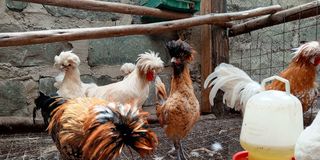
Some of the Polish Bantam birds at Charis farm in Naivasha taken on October 20, 2023.
"Beyond ornamental birds, I have diversified my agricultural business into dairy goats, kitchen gardens, rabbit farming, azolla, black soldier flies among other enterprises," she says.
Additionally, Joyce notes that the farm has now grown to be a demonstration farm where she gets to train farmers from far and wide on proper agronomical practices.
Through this, Charis Farm has been able to employ five employees at different sections of the farm.
Joyce's journey hasn't been without challenges.
“The cost of feeds for the birds is so high that I resulted in choosing an alternative food source like the black soldier fly and azolla,” she laments.
She emphasizes the importance of maintaining high standards of hygiene and disease prevention in ornamental bird farming.
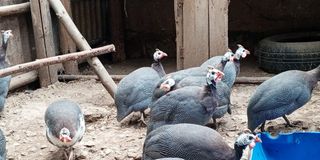
Some of the dotted Guinea Fouls at Charis farm in Naivasha on October 20, 2023.
Joyce says she has adopted organic methods to address these concerns including planting black jacks around the coops to keep off pests.
Her story serves as a testament to the power of starting small with dedication and commitment, offering encouragement to young farmers embarking on their entrepreneurial journeys.
